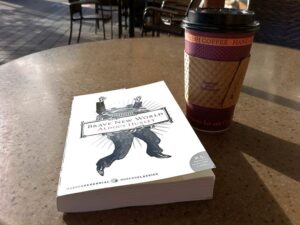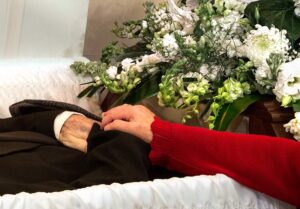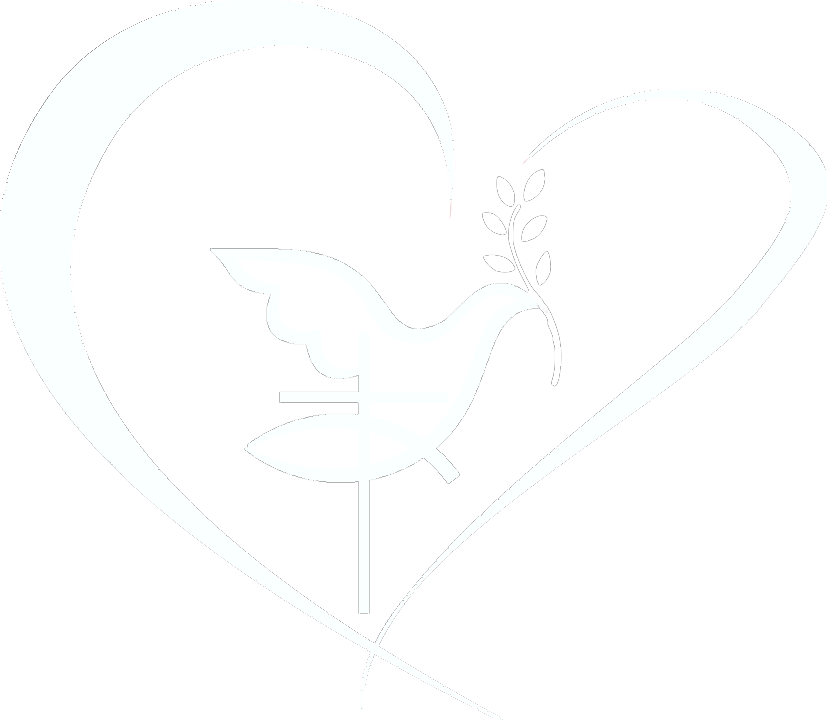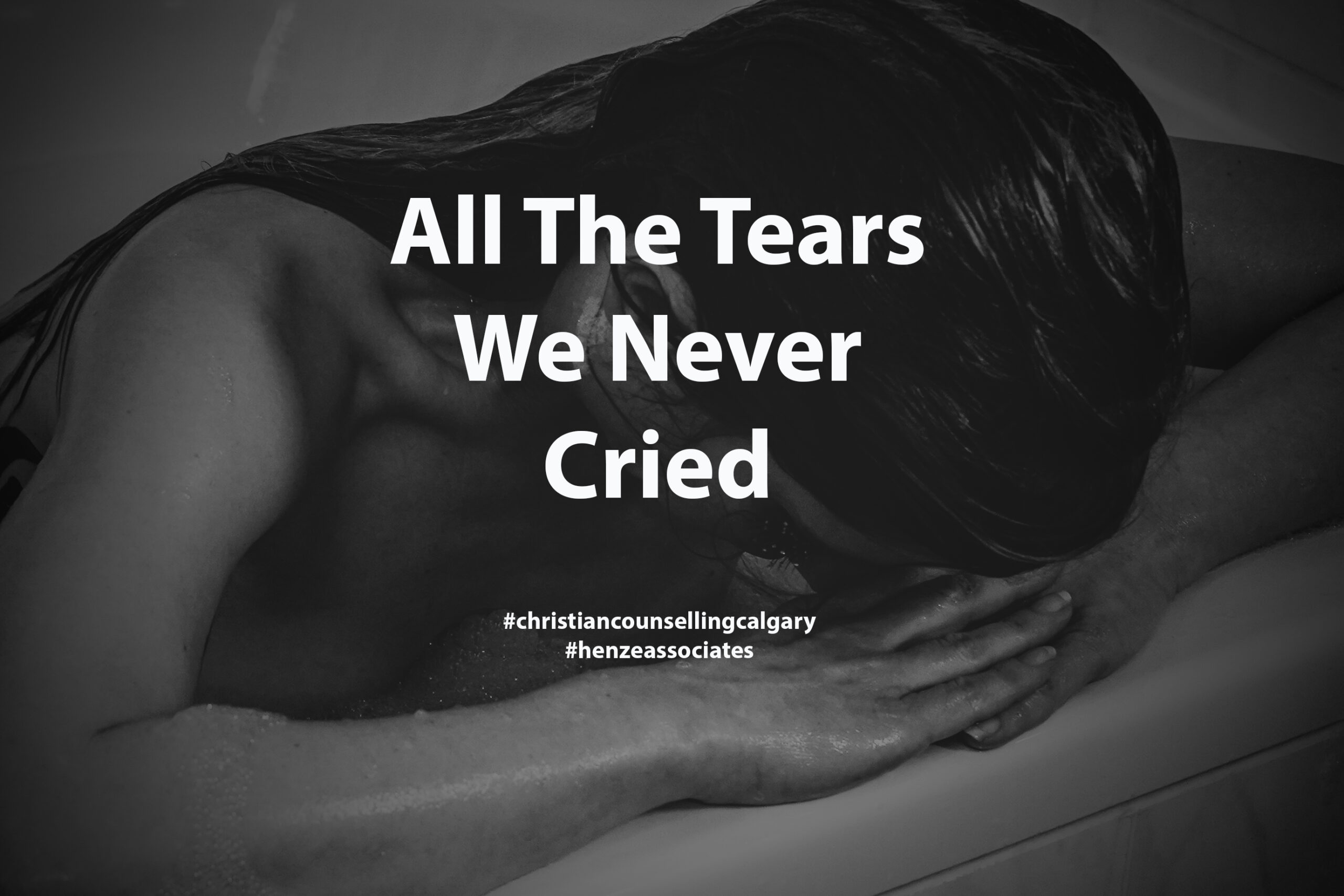Why are you crying? However good the intentions behind it may be, the question carries a message with it. It’s a wound we have all felt; an implicit sting of judgment that speaks volumes to us:
Get it together. Big boys don’t dry. Stop blubbering. Your makeup is going to run. Be a strong person. Don’t let anyone see you cry. Don’t be so clingy. No one loves a whiner. Stop being needy and high maintenance.
 The roots of those words run deep for our Calgary Counselling Services clients. They are embedded in the death-denying nature of our culture and watered by the raindrops flowing from the thunder clouds of religious dogma that decree that faith should conquer all. Those words bloom into a flower of fundamentalist thinking that clearly conveys that if we genuinely believe in the promises of God, then our hope of seeing our loved ones in eternity should erase the pain of loss today.
The roots of those words run deep for our Calgary Counselling Services clients. They are embedded in the death-denying nature of our culture and watered by the raindrops flowing from the thunder clouds of religious dogma that decree that faith should conquer all. Those words bloom into a flower of fundamentalist thinking that clearly conveys that if we genuinely believe in the promises of God, then our hope of seeing our loved ones in eternity should erase the pain of loss today.
As the tears flow, we stare into the pride of those who believe they have arrived at the pinnacle of mental health and spirituality via their ability to suppress pain. Their words speak of compassion and the desire to elevate the broken, while their eyes speak of the scorn they feel for those not as righteously-repressed as themselves.
And, when the sadness, rage and tears do not stop, the threats begin: “Be careful your lack of faith does not place you under the wrath of God.” “Maybe you need to repent of the sin of unbelief?” “Depression happens when you give ground to the Enemy…”
So, we blink away our tears, slap on our brave face and a paper-thin smile.
And everyone around us suddenly relaxes.
“Victory in Jesus” at last – right? We’re different — “we do not grieve like those who have no hope!” The grieving person must be good now — because those around him or her are no longer feeling stressed, anxious and unable to cope with the uncomfortable emotions of another…
Yet, now shredded once again by the barbed wire fences of religion surrounding Christ, our broken hearts are often screaming obscenities at God, others around and even ourselves.
Calgary Counselling Services: Uncovering and Releasing The Tears We Never Cried
In Aldous Huxley’s masterpiece of utopian fantasy, Brave New World, he paints a picture of a society where emotions are conditioned away from birth. Every citizen is constantly fed a supply of short-acting medications that serve to maintain his or her emotional world in a calm and easily controllable state. Every negative emotion is silenced while each member of that society endlessly pursues the next pleasurable experience, sexual delight or entertainment extravaganza.
 But, as we peer under the thin veneer of civilization Huxley describes, we begin to discover a world of almost embarrassing childishness. Citizens of his society are endlessly captivated by games that few would normally enjoy into their teen years. They lack any grasp of how devoid of meaning these pursuits really are or how utterly pointless their lives have become.
But, as we peer under the thin veneer of civilization Huxley describes, we begin to discover a world of almost embarrassing childishness. Citizens of his society are endlessly captivated by games that few would normally enjoy into their teen years. They lack any grasp of how devoid of meaning these pursuits really are or how utterly pointless their lives have become.
Civilization, however perfect and streamlined it may have become, is now stagnant and soulless. Life, love, relationships and intimacy have been reduced to playthings. Even the names of those lost are almost instantly forgotten. In Huxley’s world, the individual human life has been stripped of all intrinsic worth and value. The stability of society trumps any sort of individuality or unique creative urge, death itself has been drugged into meaningless and tears of grief, pain or sadness are unknown.
It’s presented as a far-out science fiction, but is it?
Some years ago, when both of my daughters were in a Christian elementary school, I remember waiting in the school’s foyer to pick them up. As I stood there, with around a dozen other parents, I glanced over to my left to see a young mother surreptitiously fishing an Ativan pill out of her purse and sneaking it into her mouth while pretending to cough. When she realized I had seen her take that medication, the look on her face made it very clear she wished that the floor would swallow her whole.
In part to spare her, I looked away and began to scan the faces and behaviours of the others in the room. As I did so, I suddenly realized how medicated the entire room full of people was. It took only seconds to spot the overmedicated stare of a pregnant mother likely reduced to a so-called “Zoloft-Zombie.” There was the slight baking-bread smell of marijuana coming from the woman to my right. Across the room from me was the facial flushing and delayed movements of alcohol abuse. One mother was quietly discussing with another how she and her son were both now on ADHD meds. As I scanned the room, I realized that only about half of the people (mostly wealthy women) in that room were not immediately identifiable as being medicated in some way.
It suddenly struck me: These fundamentalist believers were all completely comfortable living in a religion-soaked version of Huxley’s Brave New World, where big girls and boys have almost forgotten how to feel at all.
And, no tears were being shed.
For the record, the purpose of this article is not to condemn the use of psychoactive medication. As a psychologist in Calgary, I frequently send people to their doctors to discuss being put on such. I firmly believe God inspired their development, and they have provided relief to so many people.
Yet, when a society reaches the point where so many people are consuming them that the fish in our waterways are turning up developmentally delayed, anti-social and uninterested in mating, there’s something fundamentally sick about how that society is dealing with its emotions. To make matters worse, our use of these drugs is doubling roughly every ten years.
And crying now so seldom happens.
What happens when we cease to cry?
Few in modern society remain unaware of Sigmond Freud’s unholy trinity of Suppression, Repression and Denial. We see them everywhere we look. Freud kindly referred to them as psychological defence mechanisms and portrayed them as a necessary and short-term adaptive response. The problem is, they are often anything but short-term behaviours in our world.
In my work as a Calgary Psychologist and Christian Counsellor, I frequently see people who have not cried in decades. When I broach the subject, I tend to get very similar answers: “I hate crying.” “I can’t lose control.” “If I ever started crying, I’d never be able to stop.”
 Holding back tears for a short period is not a bad thing. But, even for a brief moment, doing so unleashes a cascade of physiological responses that include a stress response in the Amygdala and the Hypothalamus, which tells the entire body to go into a fight or flight response. This cascade says to the Pituitary Gland that you face a threat and directs it to produce adrenocorticotropic hormones causing the Adrenals to produce Cortisol.
Holding back tears for a short period is not a bad thing. But, even for a brief moment, doing so unleashes a cascade of physiological responses that include a stress response in the Amygdala and the Hypothalamus, which tells the entire body to go into a fight or flight response. This cascade says to the Pituitary Gland that you face a threat and directs it to produce adrenocorticotropic hormones causing the Adrenals to produce Cortisol.
Next, your physiological arousal levels spike as the sympathetic nervous system goes to high alert. Your heart rate increases, as also does the force of each heartbeat, raising your blood pressure and preparing your physical body to take swift action. Your breathing changes; you feel short of breath, and your muscles tense.
Mentally the role of your unconscious mind moves to the forefront. Your body starts to react in instinctual ways that can seem like they are outside your conscious control creating a sense of jitters and feeling that you are on edge or jumpy.
In short, your body, believing you are facing a mortal threat, mildly poisons itself to try to ensure you survive. If you were actually fighting off an attacking tiger, all of this would be a good thing — but you’re just fighting your tears. Tears that desperately need to be cried.
No matter how firmly you believe you won’t stop crying, of course, the tears will eventually cease on their own. But that belief that you will weep forever is a powerful deterrent. And when we hold back our tears, it’s like an internal lake of sadness just grows and grows.
Contrary to public opinion, nearly all Calgary Therapists will tell you that one of the worst choices you can make is holding back tears or stopping their flow before the crying is done. When we do so, we miss the experience of release that comes after the last tear is cried. We often sentence ourselves to much longer-term depression counselling in the end, especially when we avoid entire areas of pain and bury them deep in our souls.
Calgary Counselling Services: Areas of grief:
Contrary to popular belief, there is no such thing as normal grief, and no one has ever managed to define how long it should take or what it should look like. This is further complicated by the number of potential areas that may need to be grieved and the degree to which any one of those areas may prevent you from functioning in daily life.
What follows is far from an exhaustive list. It’s simply a list of common waypoints your journey of grief and loss may take you to, and an attempt to normalize taking the time to be in each one for however long it takes you to heal that part of your heart.
Pure grief:
 It has often been said that the death of a beloved pet is the purest grief possible. For most older animals, the crimes and misdemeanours of their youth have long since been abandoned. They require nothing other than a companion to cuddle up against and the occasional belly rub. They have often been there to provide comfort through so many life events and losses and, when a pet’s final day comes, their last acts are usually acts of the purest love and bonding imaginable. In these moments, the grief we experience is often among the most intense mourning possible as there are no unresolved relational tensions or barriers to love.
It has often been said that the death of a beloved pet is the purest grief possible. For most older animals, the crimes and misdemeanours of their youth have long since been abandoned. They require nothing other than a companion to cuddle up against and the occasional belly rub. They have often been there to provide comfort through so many life events and losses and, when a pet’s final day comes, their last acts are usually acts of the purest love and bonding imaginable. In these moments, the grief we experience is often among the most intense mourning possible as there are no unresolved relational tensions or barriers to love.
In contrast, we are so often told to “Speak no evil of the dead” in the face of human loss. The reason is relatively simple: Some of the dead are, in fact, quite evil – but mourners generally don’t want to hear the truth about them. (Obviously, that is terrible advice, and the truth is an essential element of healing – at least in the context of a Calgary counselling centre where we can safely express those feelings.)
However, some human losses are precisely equivalent to the purity of the loss of a pet. These are people whose hearts have been so profoundly transformed by Love that they change everyone they touch. While their deaths are uncomplicated by anger and resentment, they usually leave some of the deepest holes in the lives of those left behind. Holes that feel like we can never fill them. This is the grief most people feel the highest degree of willingness to experience – in part because it is usually so intense that they are often unable to do anything to make it stop.
Preemptive grief:
As a Calgary Christian Psychologist, one of the more difficult situations I face is managing the blind rage experienced by parents who have lost a married son or daughter. Generally, the loss has occurred after a long battle with a terminal illness, which was traumatizing enough in and of itself. But then, these grieving parents watched in disbelief as their child’s spouse or partner moved on to another relationship within months of the loss. The recriminations, rejections, conflict and even punitive measures are heartbreaking and made even more so by the parent’s inability to understand a pace of grief any different from their own.
I’ve walked with many couples as they face death together. While the parents sit on the sidelines, deny the situation, pursue miracle cures and remain remarkably detached from the impending death, the husband and wife are crying in each other’s arms nightly. They walk with each other as each loss occurs, and each tear they shed represents another goodbye. When the funeral is finally over, they have mostly cried all of the tears needed to heal from the loss and are ready to move on. Meanwhile, the funeral marks the beginning of grief for all other people in his or her life. People who now stand utterly confused at what they see as heartlessness.
Peripheral or Secondary Grief:
Secondary grief is experienced when an initial loss somehow evolves into a another wounding that sometimes even prevents mourning the initial loss. For example: As COVID rampages and the perverse selfishness of a libertarian anti-masker ideology that holds no other values beyond doing-whatever-I-want has spread, many Calgary counsellors have seen a sharp uptick in people essentially grieving funerals.
 Though they came with hopes of being able to say goodbye to their loved one in peace, they instead have coped with scenes of intense conflict. Often, they stood helplessly by as beleaguered funeral home employees attempted to compel others there to maintain social distance and wear the masks that often could have prevented the death of the loved one in the first place.
Though they came with hopes of being able to say goodbye to their loved one in peace, they instead have coped with scenes of intense conflict. Often, they stood helplessly by as beleaguered funeral home employees attempted to compel others there to maintain social distance and wear the masks that often could have prevented the death of the loved one in the first place.
Rather than grieving the loss, they sit in counselling sessions trying to grieve what disrupted their grieving and how they could never say goodbye.
People with strong tendencies towards reactance, psychopathic or even sociopathic tendencies, of course, are infamous for disrupting funerals all down through history. However, never before have those with these profound empathy deficits been so emboldened. The algorithmic outrage machine that is social media now has formed communities sufficiently large that the toxicity of their anti-social behaviours have become a badge of honour.
Regret Based Grief:
Some of the saddest and most hopeless experiences of grief I see in our Calgary Counselling Service is about grief for what might have been. This sort of grief generally falls into two categories:
- Grief over what was longed for but never received from a departed loved one.
- Grief over having failed to offer some part of one’s self to a departed loved one.
Regrets, of course, are inevitable in the wake of any sort of loss as we look back and wish we could have the person with us for one more day to say what we only thought of after the fact. However, this area is different.
Especially where there has been abuse, neglect, addiction or abandonment or something else that has fractured the relationship, there is often little closure available. The person’s death is followed by an onslaught of questions, recriminations, churning longings and rage. We helplessly look over the fence of eternity and scream, “Why didn’t you love me? What was so terrible about me that you would hurt me like that?” Or “Why didn’t I let go of the lies I believed and risk knowing you? How could I have been so blind to let go of the best gift I ever received?”
Delayed or Inhibited Grief:
As provinces and governments have closed borders, so many people have faced the heartbreaking reality of never being able to say goodbye. While funeral homes are rapidly advancing the ability to mourn via video, some of our clients have had to grieve via a series of emailed photographs, or worse. Most were unable to hold their loved one’s hand or even gaze through a window into the room where he or she laid gasping for breath.
This is, of course, as it has been in every pandemic down through the ages. But, that history changes little for those who now feel a sense of unreality and cannot continue the grieving process because of it.
People trapped in delayed or inhibited grief often display no typical expressions of grief. Instead, the pain of the loss is somatized – converted into physical pains, illness or other manifestations of that which is being repressed inside. Of all of the options, this undoubtedly has the most damaging impact on long-term health and longevity.
Complicated or Complex Grief:
 Complex grief has many similarities to complex trauma and is increasingly common in those who work in our medical system – particularly in elder care-related employment. So many dedicated medical personal have sought counselling due to the incredible powerlessness they felt as COVID 19 swept through the seniors apartments, nursing homes or extended care facilities they were employed at like a wildfire.
Complex grief has many similarities to complex trauma and is increasingly common in those who work in our medical system – particularly in elder care-related employment. So many dedicated medical personal have sought counselling due to the incredible powerlessness they felt as COVID 19 swept through the seniors apartments, nursing homes or extended care facilities they were employed at like a wildfire.
Complex grief severely inhibits a person’s ability to function in normal daily life activities such as employment or relationships and is associated with sudden, violent and repeated losses. The survivor’s personality, the social context, supports present and his or her history with loss and trauma play a key role in developing the guilt or shame, self-centred contempt and violent or suicidal urges often seen in this severe form of grief.
This area of grief almost always involves immediate psychological/medical treatment.
Unblocking grief:
One of the few universal truths about the grieving process is that it absolutely needs to be completed. If you have a gallon of tears to cry, stopping at a few cups simply will not do – and doing so cuts you off from ever experiencing the relief and releasing that finishing grieving brings. Most above-listed areas (and more) are present in the aftermath of almost every loss – and they all need to be mourned.
For the majority of people, grief doesn’t happen unless they do something to facilitate it. Perhaps you need to journal or write burn letters – hate mail you will never send. Maybe you need to express the pain via art or music or pound on a punching bag until you collapse in a sobbing heap beneath it. There is no right or wrong way to go back through the anger into the pain, so you can finally do the crying – as long as you get it done.
Speaking with a Christian Psychologist or Registered Christian Counsellor is often an essential part of this work – especially if your grief journey has become stuck.
Calgary Counselling Services: Crying those tears:
Our society has a strange and abiding affinity for Zombie movies that far eclipses its love for vampire flicks. On the surface, this is incredibly strange. While vampires are cunning and ruthless adversaries capable of generating intricate plotlines, zombie movies are all built upon the same pathetic plotline:
An outbreak occurs. Run away until they find you, shoot lots of them and then run some more, repeating this until some magical cure emerges to end the movie.
 However, when viewed through the lens of our society’s failure to grieve, unwillingness to think and the relentless suppression of painful emotions that defines so much of our culture, the abiding preference starts to make perfect sense.
However, when viewed through the lens of our society’s failure to grieve, unwillingness to think and the relentless suppression of painful emotions that defines so much of our culture, the abiding preference starts to make perfect sense.
Perhaps we’re fascinated with these movies, because we see something of our inner worlds in them?
As we look around us, we see the degree to which so many in our society live lives of suppression, repression, denial and addictive numbness. We see the religious silencing and the constant attempts to escape into entertainment and social media merge with the astonishing degree to which so many have lost the ability to think for themselves.
It doesn’t need to be this way – at least not for you. So, if you’re tired of carrying around all of the tears you never felt free to cry, perhaps it’s time to reach out to the Christian Psychologists or Registered Counselors at our Calgary Counselling Services and discover how your heart can heal itself and set you free to live again!


I’ve done a lot of grief work. Most recently after watching ” I Can Only Imagine” I bawled my damn head off for the loss of my father.
How do I grieve the loss of my husband’s job, and all the losses because of the loss of his job? I can’t seem to cry the tears I need to cry. Mostly just a tiny trickle of tears, when what’s needed is a damn waterfall!
Thanks Cal.
Yes, it’s often much more difficult to grieve ongoing suffering than an acute loss.
In part, that’s because of the, “No one ever grieves in a foxhole,” thing. But mostly, it’s because the losses come so slowly that the intense tears associated with rapidly having to catch up with a drastic life change never get triggered.
Sometimes we can trigger them through writing exercises that allow us to embrace the entire scope of the loss at once – but that often doesn’t work because those unprocessed losses simply are no longer there to be triggered.
And, if they are absent, it’s often because the “tiny trickle” was actually the grieving process.